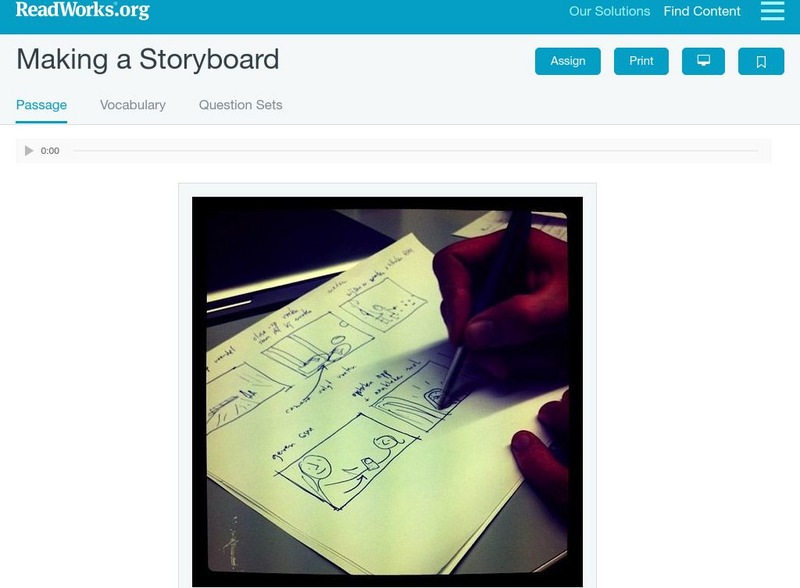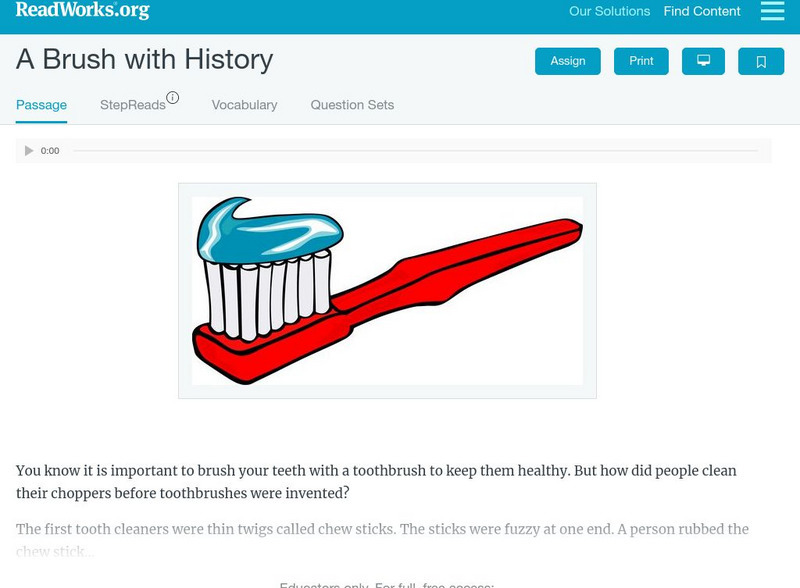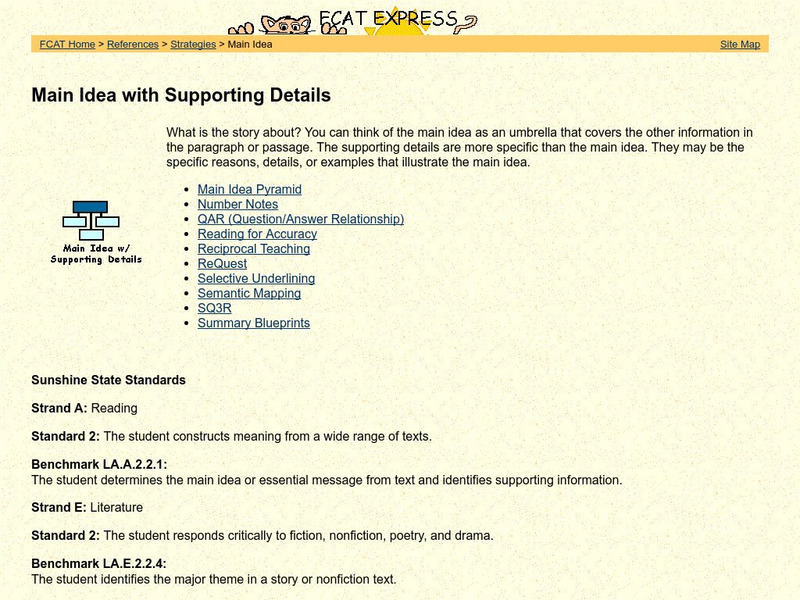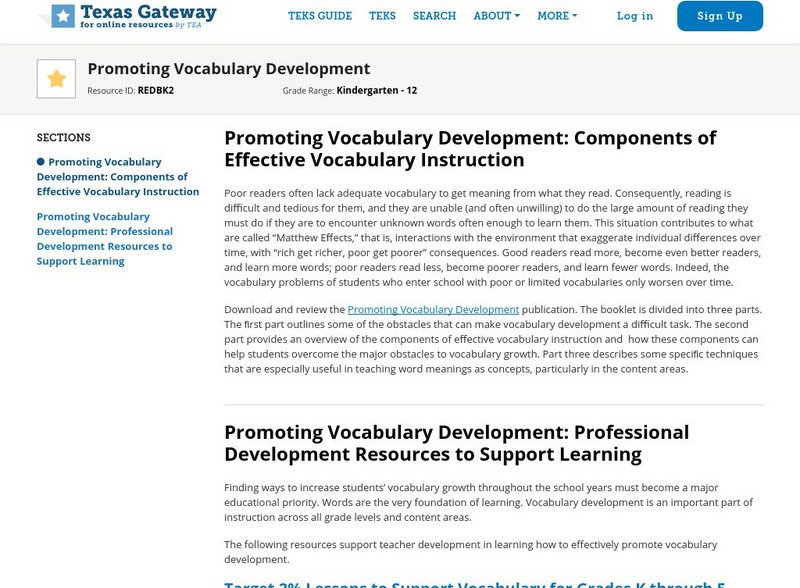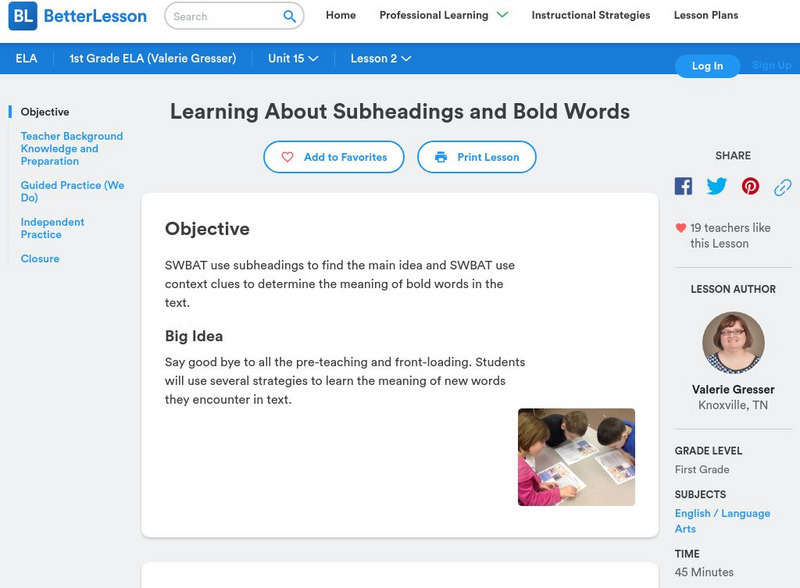Hi, what do you want to do?
Curated OER
Distinguish Fact from Opinion in Passage
Is it a fact or is it an opinion; readers need to know. Second graders learn a new technique to determine if a sentence or reading passage is fact based or opinion based. They read and then ask evidence based questions to determine if...
Curated OER
The Fable of Franny And Her Fabulous Fainting Goat
Mix the art of reading comprehension with the skill of telling time. Children in grades two and three will discuss the importance of goats throughout history based on the provided background information. They'll create cute goat...
Curated OER
Bee Dance
Everything a bee does serves a purpose. Learners in grades one through five explore the behaviors of bees through reading and dramatic puppet play. First children will create honey bee puppets, then they will discuss how bees dance to...
Curated OER
Plant Parts We Eat
I bet the kids in your class will love to eat their vegetables after an engaging lesson about edible plants. They read information about vegetables and edible plants, sort vocabulary words, identify plant parts, measure and graph the...
Curated OER
Garden Grid
Basically, your class reads about different garden plants from an included handout and seed packets that you provide, and then uses a grid to plan out where to place the plants. They can practice counting with the seeds, grouping,...
Curated OER
Lesson 3: Encyclopedias
After being introduced to non-fiction texts, second graders meet a different type of non-fiction text that can help them locate factual information. They discuss and examine all of the features found in typical encyclopedias such...
Curated OER
Lesson 2: Distinguish Fact from Opinion in Books
An important part of reading informational text is being able to discern fact from opinion. The class reads chapter one from the book, Penguins by Lynn M. Stone. They analyze specific sections of the text to determine if what...
Curated OER
Sorting in More than One Way
Sorting, categorizing, and classifying are skills learners must master for many different reasons. The class will work in small groups to list, classify, and sort a stack of familiar books. The neat part about the lesson is that the...
Curated OER
Baby Peanut Plants
Science is a subject ripe with opportunities to read informational text. Kids read to learn about peanuts! They read an informational passage, fill out two comprehension worksheets, and then conduct a lab experiment on a peanut. The...
Curated OER
Agriculture in Motion
Youngsters learn about simple machines that could be used on a farm. They learn about agricluture, listen to a farmer speak, compare and contrast different farm machines, and then design their own. Note that although the publisher...
Curated OER
Agriculture is a Cycle
What do a bicycle and the life cycle have in common? Cover this and more with the series of cross-curricular activities included in this plan. Learners do everything from making bracelets that represent the life cycle to checking out the...
Curated OER
Truth or Hogwash
Explore the history of domesticated pigs and their important byproducts. After discussing the use of pigs, class members create game boards describing the animals. While playing the game, they determine if the answers are true or...
McGraw Hill
Mc Graw Hill Education: Grade 2: Treasures: Practice Book O [Pdf]
Help second graders reinforce their understanding of the reading skills, vocabulary acquisition, phonemic awareness, and sight words with the pages in this 260-page workbook. This workbook is designed to supplement the stories from Grade...
University of South Florida
Fcat Express: Probable Passage
Site provides extensive assistance in preparing 4th grade students for Florida Comprehensive Assessment Test. This section provides help in using the "probable passage" technique to aid comprehension. In addition, links are available to...
Read Works
Read Works: Passages: Making a Storyboard
[Free Registration/Login Required] Students read a nonfiction text about a girl whose aunt is a children's book author and answer questions about comprehension, sequencing, supporting details, main idea, vocabulary, and more. Links to a...
Read Works
Read Works: Passages: A Playground Problem
[Free Registration/Login Required] Students read a nonfiction text about building a model for a new playground and answer questions about comprehension, supporting details, main ideas, vocabulary, and more. Links to a paired text and...
Read Works
Read Works: Passages: Grade 2: A Brush With History
[Free Registration/Login Required] Students read a non-fiction article about the history of a toothbrush and answer questions in comprehension, sequencing, inferences, main idea, transitions, and more. A link to paired text questions is...
University of South Florida
Fcat Express: Cause and Effect
Site provides extensive assistance in preparing 4th grade students for Florida Comprehensive Assessment Test. This section helps students identify cause and effect in literature.
University of South Florida
Fcat Express: Main Idea With Supporting Details
Strategies to help students recognize main ideas and supporting details provided by a standardized test preparation site intended for fourth grade. Includes strategies such as Main Idea Pyramids, Number Notes, QAR (Question/Answer...
Free Reading
Free Reading: Vocabulary Activities Find Activities
A fantastic reading skills site emphasizing vocabulary activities. This site contains 54 individual vocabulary activities to click on, and provides teaching tips as well. It is still in the building phase, and more activities, tips, and...
Reading Rockets
Reading Rockets: Reading Topics a to Z: Scientific Language in Primary Grades
Research on the importance of teaching scientific language usage, ideas for utilizing scientific language, and rubrics for assessing student use of scientific language in grade schools.
Read Works
Read Works: Lesson: Author's Purpose: Cause and Effect Signal Words
[Free Registration/Login Required] With this lesson plan, students can learn how several authors can write about the same topic, but for different purposes.
Texas Education Agency
Texas Gateway: Reading Instruction: Promoting Vocabulary Development
This site provides a free download of the Promoting Vocabulary Development publication. The booklet is divided into three parts: Obstacles that make vocabulary development difficult, Components of effective vocabulary instruction and how...
Better Lesson
Better Lesson: Learning About Subheadings and Bold Words
In this lesson, students will use several strategies to learn the meaning of new words they encounter in text. The students will learn specific strategies so when they encounter new words, they can figure out the meaning of those words...

















![Mc Graw Hill Education: Grade 2: Treasures: Practice Book O [Pdf] eBook Mc Graw Hill Education: Grade 2: Treasures: Practice Book O [Pdf] eBook](https://content.lessonplanet.com/knovation/original/18010-f370394f886702c6069b596e21a006e0.jpg?1661551625)

